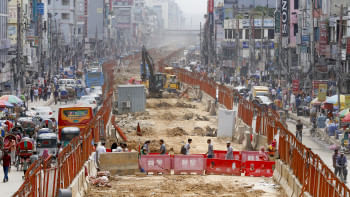City of dreams and struggles

For students living in Dhaka, the urban nightmare that the capital has morphed into is frightening. Blaring, relentless traffic turns every commute into a battle, broken roads compromise safety and breed discomfort, and the rampant air pollution is a slow poison – these are aspects we are all familiar with unfortunately. Yet, none of us have really become accustomed to it. So, what then happens to the students who are new to the city? The ones who have left their hometowns behind to pursue an education and make their dreams a reality. How do they perceive the Gordian mess, which is Dhaka?
Abrar Jahan Arpita, an undergraduate student at the Department of Law at North South University (NSU), hailing from Mymensingh, recalls her first time visiting Dhaka as a child, "I have fond memories of my childhood in Mymensingh, where I'd spend most of my afternoons playing in fields with my friends. I learned how to swim and fish in a nearby pond with my father. In Dhaka, however, there wasn't much space for kids to play except for cramped garages or rooftops. Everywhere I looked, it was just one building after another and never-ending construction."
Having to live in the capital as a student has become a series of decisions that compromise Arpita's immunity. "My physical health has clearly deteriorated since I moved here. Dhaka's air pollution is the most stressful as it triggers my asthma, to the point where I have to miss classes. The city feels very suffocating, often making it difficult for me to breathe."
Even food – a basic necessity – poses difficulties for students to access due to its lack of affordability and quality. Shrabonty Deb Ina who is from Sylhet and a student at the Department of English and Humanities at the University of Liberal Arts Bangladesh (ULAB), notes, "In my hometown, everyone prefers home-cooked meals as opposed to dining out, which is done only occasionally. But in Dhaka, I have observed that dining out or ordering in is a common practice, even if one lives with their family. I live in a hostel where the food served is hardly ever good. I rarely have time to cook either. So, I almost always have to opt to dine out as well."
"However, the meals aren't affordable. If the meals are affordable then the place itself isn't very inviting. Nice cafes or restaurants that serve good food come with expensive prices. As a result, food takes up most of my expenses, which is why I often have to forgo doing or buying other things. It simply isn't feasible with my budget," she says. "Moreover, the quality of food here is bad, especially the fruits and vegetables. Depending on my monthly budget, I don't even buy them sometimes. A lack of proper nutritious food coupled with my habit of eating outside has taken a toll on my health."
For many students, especially those without the comfort of family members, the housing conditions of Dhaka, too, present challenges.
Shayonto Hasan of Rajshahi, a student at the Department of Computer Science and Engineering (CSE) at BRAC University, currently living in a house for bachelor's, reveals, "I live close to my university and the rent here is very high, around 20,000 taka or more for a two-bedroom house but the living conditions are very poor. There is no proper drainage system, the roads are narrow and broken, and there's no gap between the houses. From a bird's eye view, anyone can tell how unplanned and unorganised this place is. We often tell each other that even the worst street in Rajshahi is better than Badda's best street."
Moreover, the capital's frustrating traffic and road conditions do not make things easier. Shayonto states, "In Rajshahi, I can travel to the farthest of places in just 20 to 30 minutes. In Dhaka, it can take one to two hours just to travel the smallest distance. Sometimes, walking to my destination takes less time than travelling by vehicle. Additionally, despite being the capital city, the footpaths of Dhaka are the worst. In most places, you cannot even use them as they are either entirely broken or half covered by hawkers."
Coupled with the pressure to succeed and secure their well-being, students are always on the edge, worsening the mental strain of having to adjust to such a cluttered and demanding city.
Shrabonty shares, "There is no guarantee that once I leave my house, I'll return home safely. From mugging and reckless driving to random acts of violence, often targeted towards women, there is no way to distinguish between good and bad people. I am constantly on edge regarding everyone. Having to be vigilant all the time is draining. Thoughts about my future and its uncertainty are always on the back of my mind as well. Everyone comes to Dhaka with a dream and there is a constant unrelenting pressure to fulfil it."
Yet, the very thing which brought these students to the capital city seems to be free of stains for some. Arpita remarks, "Unexpectedly, Dhaka's environment has positively influenced my academic performance. Since I live close to my university, it spares me from the exhausting traffic and saves me time and energy. Everyone around me is quite dedicated to their education and future aspirations, which motivates me to perform better academically as well."
The rapid urbanisation of Dhaka has constructed a landscape brimming with promises and challenges alike. With each day appearing to be an endless grind, it's plain to see that dreams come with a cost. Yet, waiting around for much-needed solutions – which are often talked about and seldom implemented – cannot be an option. With no way around the overwhelming urban demands of Dhaka, newcomers are forced to accept such a city.
Arpita says, "I try to maintain a routine to help balance work, rest, and a healthy lifestyle. By hanging out with my friends and exploring new places, the monotonous life of this city becomes a little more vivid."
"Always stay positive, that's my motto," says Shrabonty. "At the end of the day, no one else has my back. It's on me to take care of myself, to ensure my well-being. I will always encounter challenges but I cannot afford to give up."

 For all latest news, follow The Daily Star's Google News channel.
For all latest news, follow The Daily Star's Google News channel. 







Comments